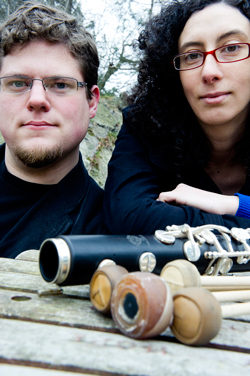by Jarrett Hoffman

Transient Canvas has commissioned over 75 works, toured extensively in the U.S. and Europe, and this past August released their first album, Sift, on New Focus Recordings. In a recent speaker-phone conversation, I asked Advocat and Sharrock — on their way to Indianapolis from Syracuse as they begin their most recent tour — how they formed the group back in 2011.
Amy Advocat: Should we tell the actual story?
Matt Sharrock: Yeah, tell the actual story.
AA: We met when we both had jobs as telemarketers that summer.
MS: I had just finished my master’s from Boston Conservatory in marimba performance. I was doing that whole post-school, how-am-I-going-to-pay-my-rent-over-the-summer kind of thing.
AA: I was looking to buy my first car — I’m a late bloomer when it comes to driving. I thought, ‘You know what, I’ll work here for five weeks and have some money for a car.’ So we both found ourselves doing this work which was really out of our normal zones. We got along and wanted to read some music together. Eventually we had some composers interested in writing for us, and we ended up putting together a program by the end of that first season with two commissions. At the time it still seemed like we were just friends hanging out, and all of the sudden, it became a thing.
Jarrett Hoffman: In the program notes, Matt writes that the concert is divided into two halves: the cerebral/academic and the emotional. Where do each of you fall on that spectrum?
MS: I think we’re both kind of cerebral people.
AA: We are, but I still think artistically I have an emotional connection to the music more than cerebral.
MS: I have an emotionally cerebral approach to music (laughs). We built the program because of Adam Roberts’ Nostalgia Variations, thinking about what the word ‘nostalgia’ means and the baggage it contains — that’s where the second half comes from. We put this weird, seven-minute reimagining of a Jacques Brel song by Beau Kenyon before that. It doesn’t sound like Brel’s music.
AA: It’s Beau’s interpretation, his feelings about Brel’s music.
MS: He kind of writes a musical poem based on the lyrics. And for the first half we wanted to showcase some of our pieces that deal with more intellectual kinds of events. Cliff Ingram’s Cold column, calving deals with both global warming and a Renaissance song, mixed with theories about how the brain processes information. And Jonathan Bailey Holland takes the word ‘rebounds’ and makes a nice, concise piece based around it.
JH: Commissioning is both exciting and risky. What do you do when a piece just doesn’t work?
AA: It’s definitely happened before. Sometimes we’re lucky and the composer says, “Oh my gosh, that’s not good enough and I want to fix it.”
MS: We’ve been really fortunate in that we like the vast majority of the pieces we’ve commissioned. Sometimes you can see that there’s a good piece in there, but it just needs to be hammered out, and we’ll ask a composer, “Would you consider revising this?” Most people have said they wanted to but were scared to say anything. Those pieces have become quite successful. And then there are the pieces that are just bad, or aren’t us.
AA: I don’t think we’ve gotten things like that recently.
MS: It’s very rare that we get those, partly because we know the people we commission and are very familiar with their music. But either way, when we commission someone, we promise them at least three performances and get them a great recording or multi-angle video so they can get the piece out to people who might be interested. If I say, “I don’t like this piece, it is bad,” someone else might say, “That piece is awesome!”
AA: We want pieces to have a real life after a premiere and have other people play them and hear them — that’s our biggest mission. I don’t think it necessarily helps anyone to just have one performance. Sometimes we’re surprised that a piece grows on us through collaboration or revision, or just through getting to know it more.
MS: In terms of the risk of commissioning, we like not knowing what we’re going to get. Sometimes composers ask us what kind of piece we want, and we just tell them it should be between four and fifteen minutes, and it should be what they want it to be.
AA: Right now we have a fellowship where we’re working with three paid younger composers throughout the season. I can’t wait to see what they’re doing because they all have such different ideas. They’ve been trying to ask us what we want and we’re like, ‘Do your thing. We’re going to help you, but we don’t want to sway you at all. If you have a strange sound sculpture piece in mind, then go for it.’
Published on ClevelandClassical.com November 14, 2017.
Click here for a printable copy of this article



